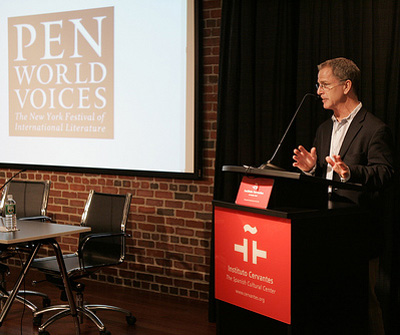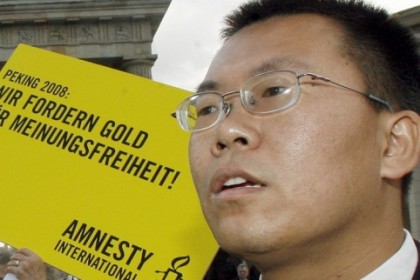Chinese Activists Arrested While the International Eye is on Other Countries
by Amanda Cardo / April 5, 2011 / 1 Comment

Larry Siems, Copyright © 2008 by PEN American Center/Beowulf Sheehan
While the attention of the international media has been focused on North Africa and the Middle East, the Chinese government has taken advantage of the lowered international surveillance to repress its citizens’ freedom of speech. The Independent Chinese PEN Center (ICPC) reported that between February 19 and 22, at least thirteen members were detained, and as many as 105 unassociated dissident writers, lawyers and activists have been harassed, summoned, kidnapped or put under house arrest.
Just two days ago Ai Weiwei, the Chinese visual artist, was detained at the airport in Beijing. One of his new installations will tour the U.S. starting in May and the destinations include the Warhol Museum & Carnegie Museum of Art in Pittsburgh.
Larry Siems, who directs the PEN American Center’s Freedom to Write program, gave Sampsonia Way a few moments of his time to talk about the current state of affairs in China, the mainstream media’s coverage, and the ways our readers can support freedom of expression in China.
Can you give us a brief summary of what has happened in China in the past few weeks, and what is happening right now?
Since mid-February, coinciding with the events in North Africa and the Middle East, there has been an increase in oppression in China. The restrictions that writers and human rights activists have been facing have increased dramatically. Both Teng Biao, a lawyer for ICPC members, and Liu Xia, the wife of Nobel Peace Prize recipient Liu Xiaobo, are under house arrest. Since their incarceration, things have only gotten worse.
Who else has been arrested?
On March 2, the ICPC webmaster Ye Du was detained. Security police went to his house, seized his computers, and he has been in detention since. His family has been told to expect that he will be charged and prosecuted for “inciting subversion of state power”, which is the same charge that Liu Xiaobo was prosecuted on. Liu Xiaobo is currently serving an eleven year prison term.

Teng Biao, a lawyer for ICPC members, who is under house arrest
The PEN American Center’s March 3 press release is about the treatment of foreign journalists in China. Can you give us some details about that situation?
That statement is a joint release from our organization as well as from the Committee to Protect Journalists. In late February and early March, foreign correspondents from major international news outlets CNN, the New York Times, Le Monde, and others were harassed, beaten up, and had their equipment stolen or confiscated. China is restrictive with its own media, but it is usually less restrictive with international media. The fact that they were threatening and physically intimidating foreign journalists indicates that things have gone past “bad” to “severe” in China.
What else has China done to oppress dissent aside from the arrests of literary figures and lawyers?
The New York Times reported that the Chinese government had been squeezing GMail traffic, monitoring in-going and out-going traffic, and in general making it difficult for people to use their email accounts. All of this is an indication that China is fearful of the popular protests going on in North Africa and the Middle East, and that the government will do anything to suppress any hint of dissent.
Has the media attention been sufficient for these events in China?
There have been some great articles in the New York Times and other major news organizations. China’s behavior is outrageous enough that they’ve attracted press attention, but it’s true that the other governments of the world are preoccupied by events elsewhere. That allows China to escape some of the international criticism they ought to be getting. It’s one thing to have articles appear the day after something happens; the Chinese government says they can weather that instant reaction. But it’s the second round of coverage, the coverage that reaches outside audiences, that is important. Follow-up coverage lets the Chinese government know that we’re all still watching.
Has there been any international intervention or statement regarding the recent arrests?
There have been a lot of statements made. Governments and NGOs understand the situation is extremely, extremely serious. We try to keep in contact with the US government and everyone is aware of the problem. There’s just no denying that we’re in one of the chilliest moments for human rights in China in a long time.
What can Sampsonia Way’s readers do to help the situation or support the cause?
Supporting PEN is certainly great. Becoming an associate member allows people who care about books, literature, and freedom of expression to get hooked into all of our regular actions, sign petitions, write letters on individual cases, and attend public events.
Those interested in furthering PEN’s support for freedom of expression can also donate at their website.
Read ICPC president Tienchi Martin-Liao’s speech on protest in China.
Read PEN American Center press releases.





One Comment on "Chinese Activists Arrested While the International Eye is on Other Countries"
Trackbacks for this post